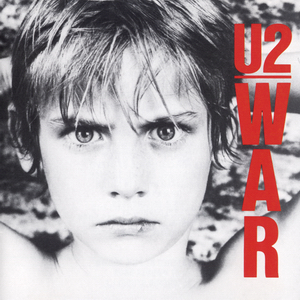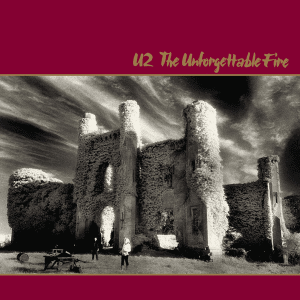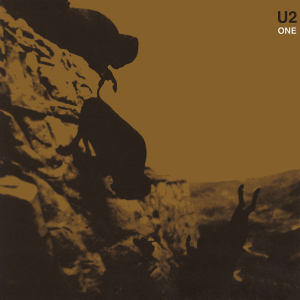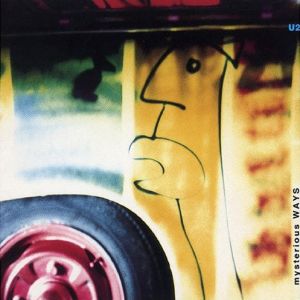
U2 are an Irish rock band from Dublin, formed in 1976. The group consists of Bono, the Edge, Adam Clayton, and Larry Mullen Jr.. Initially rooted in post-punk, U2's musical style has evolved throughout their career, yet has maintained an anthemic quality built on Bono's expressive vocals and the Edge's chiming, effects-based guitar sounds. Bono's lyrics, often embellished with spiritual imagery, focus on personal and sociopolitical themes. Popular for their live performances, the group have staged several elaborate tours over their career.

October is the second studio album by Irish rock band U2. It was released on 12 October 1981 by Island Records, and was produced by Steve Lillywhite. The album was lyrically inspired by the memberships of Bono, the Edge, and Larry Mullen Jr. in a Christian group called the Shalom Fellowship, and consequently it contains spiritual and religious themes. Their involvement with Shalom Fellowship led them to question the relationship between the Christian faith and the "rock and roll" lifestyle, and threatened to break up the band.

War is the third studio album by Irish rock band U2. It was produced by Steve Lillywhite, and was released on 28 February 1983 on Island Records. The album is regarded as U2's first overtly political album, in part because of songs like "Sunday Bloody Sunday" and "New Year's Day", as well as the title, which stems from the band's perception of the world at the time; lead vocalist Bono stated that "war seemed to be the motif for 1982."

The Unforgettable Fire is the fourth studio album by Irish rock band U2. It was produced by Brian Eno and Daniel Lanois, and released on 1 October 1984 by Island Records. The band wanted to pursue a new musical direction following the harder-hitting rock of their previous album, War (1983). As a result, they employed Eno and Lanois to produce and assist in their experimentation with a more ambient sound. The resulting change in direction was at the time the band's most dramatic. The album's title is a reference to "The Unforgettable Fire", an art exhibit about the atomic bombing of Hiroshima.

"Miss Sarajevo" is a song by Irish rock band U2 and British musician Brian Eno, credited to the pseudonym "Passengers". It was released on 20 November 1995 as the only single from their album Original Soundtracks 1. Italian tenor Luciano Pavarotti makes a vocal appearance, singing the opera solo. The song was written about a group of women who held a beauty pageant during the Siege of Sarajevo as an act of defiance.

"Where the Streets Have No Name" is a song by Irish rock band U2. It is the opening track from their 1987 album The Joshua Tree and was released as the album's third single in August 1987. The song's hook is a repeating guitar arpeggio using a delay effect, played during the song's introduction and again at the end. Lead vocalist Bono wrote the lyrics in response to the notion that it is possible to identify a person's religion and income based on the street on which they lived, particularly in Belfast. During the band's difficulties recording the song, producer Brian Eno considered erasing the song's tapes to have them start from scratch.

"One" is a song by Irish rock band U2. It is the third track from their seventh album, Achtung Baby (1991), and it was released as the record's third single in February 1992. During the album's recording sessions at Hansa Studios in Berlin, conflict arose between the band members over the direction of U2's sound and the quality of their material. Tensions almost prompted the band to break up until they achieved a breakthrough with the improvisation of "One"; the song was written after the band members were inspired by a chord progression that guitarist the Edge was playing in the studio. The lyrics, written by lead singer Bono, were inspired by the band members' fractured relationships and the German reunification. Although the lyrics ostensibly describe "disunity", they have been interpreted in other ways.

"New Year's Day" is a song by Irish rock band U2. It is the third track on their 1983 album War and was released as the album's lead single in January 1983. With lyrics written about the Polish Solidarity movement, "New Year's Day" is driven by Adam Clayton's distinctive bassline and the Edge's piano and guitar playing. It was the band's first UK hit single, peaking at number 10, and was also their first international hit, reaching for number 9 in Norway, number 11 on the Dutch Top 40, number 17 in Sweden, and number 53 on the Billboard Hot 100 in the United States, becoming the band's first single to chart in the US.

"Mysterious Ways" is a song by Irish rock band U2. It is the eighth track from their 1991 album, Achtung Baby, and was released as the album's second single on 2 December 1991. The song began as an improvisation called "Sick Puppy", with the band liking only the bass part that bassist Adam Clayton composed. The band struggled to build a song from it, with vocalist Bono and producer Daniel Lanois arguing intensely during one songwriting session. The song's breakthrough came after guitarist the Edge began experimenting with the Korg A3 effects unit. "Mysterious Ways" features a danceable beat, funky guitar hook, and conga-laden percussion, as well as mystical lyrics by Bono about romance and women.

"The Fly" is a song by Irish rock band U2. It is the seventh track from their 1991 album, Achtung Baby, and it was released as the album's first single on 21 October 1991. "The Fly" introduced a more abrasive-sounding U2, as the song featured danceable hip-hop beats, industrial textures, distorted vocals, and an elaborate guitar solo. Lead vocalist Bono described the song as "the sound of four men chopping down The Joshua Tree", due to its departure from the sound that had traditionally characterised the band in the 1980s.

"Pride (In the Name of Love)" is a song by Irish rock band U2. It is the second track on the band's 1984 album, The Unforgettable Fire, and was released as its lead single in September 1984. The song was produced by Brian Eno and Daniel Lanois. Written about the American civil rights leader Martin Luther King Jr., "Pride" received mixed critical reviews at the time, but it was a major commercial success for U2 and has since become one of their most popular songs, as well as been re-evaluated positively by many as one of the greatest songs of all time. It appeared on the band's compilation albums The Best of 1980–1990 and U218 Singles and was reworked and re-recorded for Songs of Surrender (2023).

"40", also known as "40 (How Long)", is a song by Irish rock band U2. It is the tenth and final track on their 1983 album, War. The song is noted for its live performances; guitarist the Edge and bassist Adam Clayton trade instruments during performances of it, and as it was commonly played to end their concerts, the band would leave the stage one-by-one as the audience continued to sing the refrain "How long to sing this song?". The lyrics are a modification of the Bible's Psalm 40.

"11 O'Clock Tick Tock" is a song by Irish rock band U2. It was released as a single on 16 May 1980, and was produced by Martin Hannett. It followed their debut EP Three and the single "Another Day." It was the group's first release for Island Records. The song's lyrics were written by lead vocalist Bono based on his experience at a Cramps concert in London, where he watched a "lifeless, goth-style" crowd from the balcony.
"Until the End of the World" is a song by rock band U2 and the fourth track from their 1991 album Achtung Baby. The song began as a guitar riff composed by lead vocalist Bono from a demo, which the band revisited with success after talking with German filmmaker Wim Wenders about providing music for his film Until the End of the World. The song's lyrics describe a fictional conversation between Jesus Christ and Judas Iscariot. The first verse discusses the Last Supper; the second is about Judas identifying Jesus with a kiss on the cheek in the Garden of Gethsemane; and the final is about Judas' suicide after being overwhelmed with guilt and sadness.
"Bad" is a song by Irish rock band U2 and the seventh track on their 1984 album, The Unforgettable Fire. Thematically, the song is about heroin addiction, though lead vocalist Bono has given varying accounts of who was the inspiration behind his lyrics. "Bad" is considered a fan favourite and is one of U2's most frequently performed songs in concert. The band's 12-minute performance of the song at the Live Aid charity concert in 1985 was a breakthrough moment for them.

"Sunday Bloody Sunday" is a song by Irish rock band U2. It is the opening track from their 1983 album War and was released as the album's third single on 21 March 1983 in the Netherlands and West Germany. "Sunday Bloody Sunday" is noted for its militaristic drumbeat, harsh guitar, and melodic harmonies. One of U2's most overtly political songs, its lyrics describe the horror felt by an observer of the Troubles in Northern Ireland, mainly focusing on the 1972 Bloody Sunday incident in Derry where British troops shot and killed unarmed civil rights protesters. Along with "New Year's Day", the song helped U2 reach a wider listening audience. It was generally well received by critics on the album's release.

U2 Live at Red Rocks: Under a Blood Red Sky is a concert film by Irish rock band U2. It was recorded on 5 June 1983 at Red Rocks Amphitheatre in Colorado, United States, on the group's War Tour. Originally released in 1984 on videocassette, U2 Live at Red Rocks was the band's first video release. It accompanied a 1983 live album entitled Under a Blood Red Sky, on which two tracks from the film appear. The video was directed by Gavin Taylor and produced by Rick Wurpel and Doug Stewart.
This is a timeline of the history of rock band U2:
"Love Is Blindness" is a song by rock band U2, and the twelfth and final track on their 1991 album Achtung Baby. The song was written on piano by lead singer Bono during the recording sessions for U2's 1988 album Rattle and Hum. Originally intending to give the song to singer Nina Simone, the band decided to keep it for Achtung Baby after playing it together. Thematically, the song describes a failing romance, mixing personal themes with imagery of metaphorical acts of terrorism. During the recording sessions for Achtung Baby, guitarist the Edge separated from his wife, Aislinn O'Sullivan. The separation had a major effect on the development of the song; Bono said that the ending guitar solo was a cathartic experience for the Edge, as he snapped several guitar strings during the recording.

"Stay " is a song by rock band U2. It is the fifth track on their 1993 album, Zooropa, and was released as the album's third single on 22 November 1993. The song reached number one in Ireland and reached the top 10 in Australia, Iceland, the United Kingdom, and several other countries. The music video was shot in Berlin, Germany. The earliest incarnation of the song developed during sessions for the group's 1991 album Achtung Baby. It was written for and inspired by Frank Sinatra and bore his surname as the original working title. An alternative recording was used in the Wim Wenders film Faraway, So Close!.


















